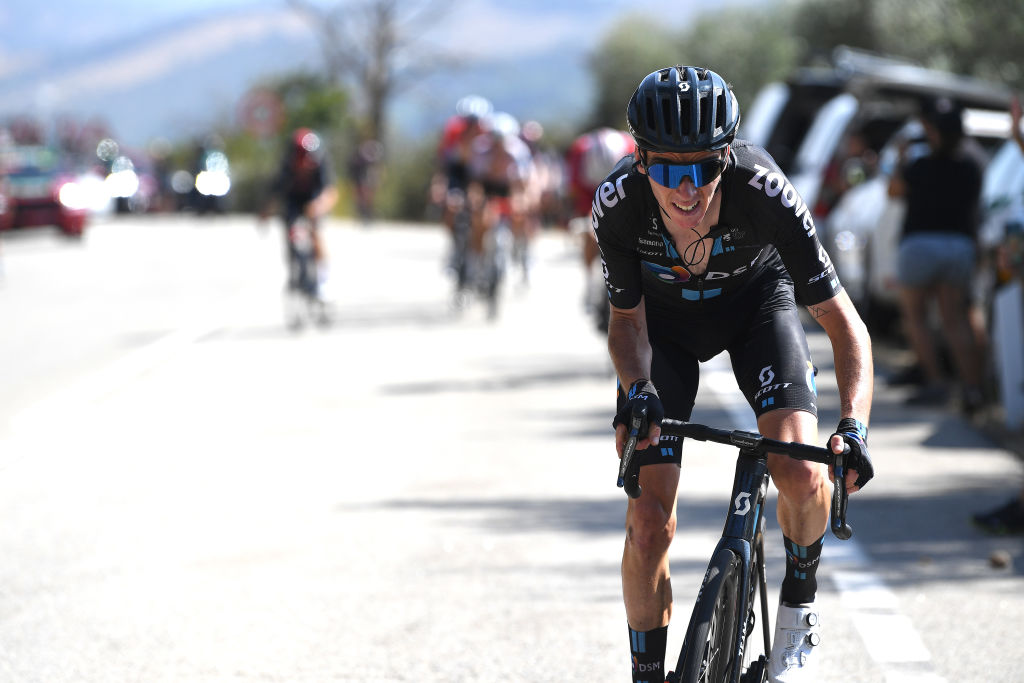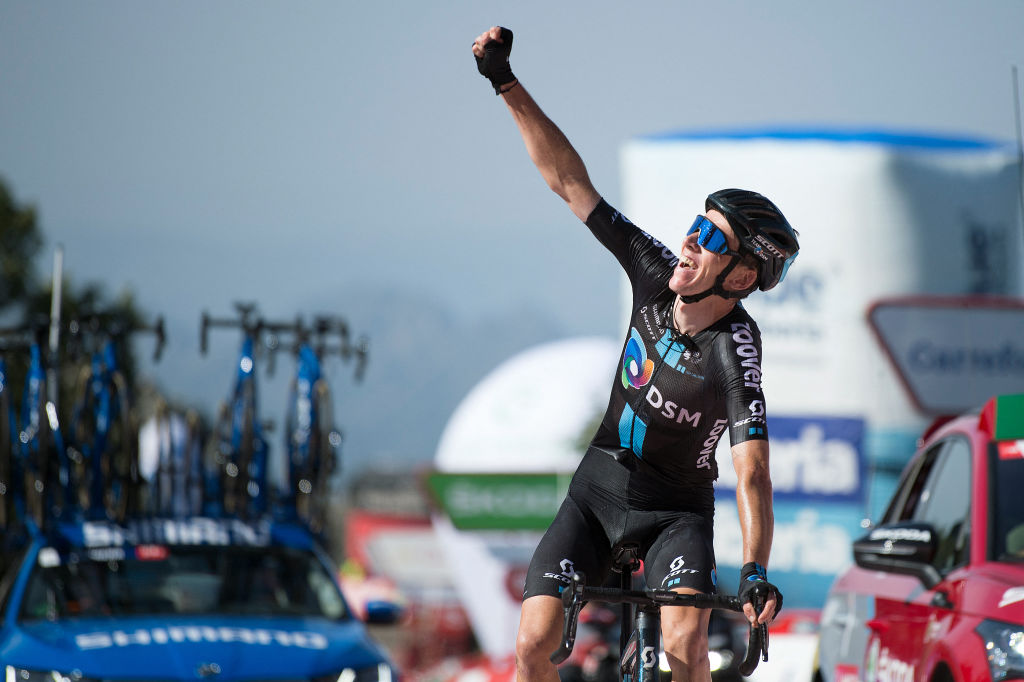Romain Bardet: Departures haven't affected the morale at DSM
Frenchman finds the joy amid demands of modern cycling

A few hours before the Team DSM presentation on Thursday morning, a two-part story on the Sporza website painted an unflattering picture of the team’s supposedly inflexible approach. One unnamed former rider was quoted as seeing members were treated “like little children.” Another described it as “a Soviet regime.”
The story followed news earlier this week that Tiesj Benoot had become the latest in a line of riders to leave DSM before the end of his contract, citing problems with the team’s modus operandi. His early departure – for Jumbo-Visma – follows those of men like Marcel Kittel, Warren Barguil, Tom Dumoulin, Michael Matthews, Marc Hirschi and Ilan Van Wilder, and it has raised further external questions about the team’s methods, although one recent arrival maintains that it has had no impact on the team’s morale.
Romain Bardet came to DSM at the start of 2021 in search of a new challenge and fresh way of working after spending his entire professional career to that point at AG2R. The Frenchman, meticulous to the nth degree even as an amateur rider, was pleased to find the team’s methodological approach precisely as advertised, and he told Cyclingnews on Thursday that the recent transfers of Van Wilder and Benoot had not changed the atmosphere inside the camp.
“It hasn’t had an impact on morale because the team is transparent and has a very clear way of working,” Bardet said following the team presentation in the Netherlands. “It’s always very honest: you know that you have to give the best of yourself, because it’s the least you can do in such a high-level environment. And the team has always thought in terms of what’s best for the whole group.
“Of course, sometimes riders have different ambitions, but no departure has affected the morale of the riders here, because we have confidence in the work of the staff and the experts around the team on a daily basis. It’s not a disruption. It’s honest and courageous on the part of the team to allow someone follow his own path and leave rather than have a conflict. From my point of view, it hasn’t affected us. I haven’t shared the doubts of the riders who left, so it’s not easy for me to understand.”
Then again, after almost a decade as the totemic figure on AG2R, Bardet perhaps felt a certain relief at leaving a team so heavily invested in his image for one that espoused a more collective philosophy. In some respects, a change was as good as a rest. It may have taken time for the new approach to bear fruit – like many at DSM, Bardet confessed to being short of his best in the opening phase of the season – but he ended the campaign strongly. Seventh overall at the Giro d’Italia and his first wins in three years at the Vuelta a Burgos and Vuelta a España were the notable high points, but there were less obvious satisfactions too, such as his progress against the watch.
“It was different. I took a lot of pleasure from this year, but then I always did that before too, because at AG2R, I was fortunate enough to ride in a family ambience,” Bardet said. “But this year, it was also a pleasure to work in a new way and see the progress I could make at a physical level over the course of the year. I was at a consistently high level in the second part of the season, from Burgos to Lombardia, and that gave me a lot of confidence in the approach of the team.
Get The Leadout Newsletter
The latest race content, interviews, features, reviews and expert buying guides, direct to your inbox!
“I improved in specific performance aspects. I’m not a specialist but personally I did very good time trials at the Vuelta, twice in the top 20, I think, which had never happened in 10 years of a career. Working with the experts at DSM raised my level and also gave me a lot more mental freshness.”
Two Grand Tours in 2022
Bardet’s first campaign at DSM saw him forgo the Tour de France for the first time since his maiden professional season in 2012, preferring to tackle the Giro and Vuelta. It is not yet decided if he will return to the Tour next July, but he confirmed that he is set to ride two Grand Tours once again in 2022, targeting the general classification in one and stage wins in the other.
“I think it’s interesting to be at a point in my career where I can really do two Grand Tours in one year. I think that corresponds well to my profile but we still have to decide which Grand Tours I will do, and in which one I’ll aim for the GC and in which one I’ll aim for stages,” said Bardet, who added that his Classics ambitions would again be a secondary consideration next season.
“I think it wouldn’t be reasonable to build the first part of the season around three one-day races. The desire at DSM is also to explore my potential in the Grand Tours, and I’m really concentrated on that.”

A podium finisher at the Tour in 2016 and 2017, Bardet’s results over three weeks have regressed in the years since, even though he recorded some of his highest-ever power data on the 2020 edition before he was forced out by a crash. By his own admission, he was short of his best at the Giro as he adapted to DSM’s training programme, but he drew encouragement from his seventh-place finish in Milan all the same.
“I was in very good form but not at 100 per cent, although I’m still happy with how I rode,” he said. “I was at the front in a race that I didn’t know, and the level of competition was very high. It was a good start.”
The lingering disappointment from the Giro wasn’t so much slipping out of the top five in the final time trial as missing out on stage victory. Bardet took second behind an unassailable Egan Bernal (Ineos Grenadiers) on the abridged tappone to Cortina and he was dropped by a rampant Damiano Caruso (Bahrain Victorious) on the penultimate stage up Alpe Motta. Never a prolific winner, Bardet had lost the habit altogether in recent seasons, which made his wins over Picón Blanco at the Vuelta a Burgos and atop Pico Villuercas at the Vuelta a España all the more significant.
“Those wins were really important,” he nodded. “I had developed the bad habit of only focusing on the GC because I realised that I was very consistent. But in the last years, I was generally in and around fifth or sixth or seventh place, but never winning. I was making a lot of sacrifices and working very hard without having the satisfaction of raising my arms or being on the podium. So it was a turning point to come to DSM and have the chance to go and win again and raise my arms, to enjoy going on the attack and racing with that spirit.”
No more grey areas
‘Enjoyment’ is a word that recurs several times in the conversation, which is striking given that some near contemporaries have already called time on their careers or sought alternative outlets on the gravel scene. For many, the joy has been gradually been squeezed out of a sport where seemingly no gain is too marginal to be hunted to the point of extinction. The expectation is that modern cycling’s demands, mental and physical, will shorten careers, but Bardet is happy to continue for as long as he can strike a balance between the peloton and the real world.
“It’s very personal. It’s true that it requires a lot now to be at a very high level. Results are harder and harder to obtain, and a crash can see you lose months of preparation in an instant, so there’s a lot of frustration,” Bardet said.
“But for me, the two indicators are whether I feel good in my family life and whether I can still fight for victory in the biggest races. So long as those two fundamental points are in place, I’ll have the motivation.
"I’m conscious of the sacrifices you have to make to be at a high level, but I’ll make them so long as I’m competitive and capable of winning stages in Grand Tours or fighting for the podium. And meanwhile, if I can maintain that balance between competition and my family life, that’s the most important thing. It’s not only the physical aspect.”
In recent months, Bardet has also been vocal in raising the alarm about the use of ketones in the professional peloton. The practice is forbidden by the additional, voluntary rules of the Movement for Credible Cycling – Bardet and DSM are among the MPCC’s members – but some WorldTour squads have admitted using the product.
The UCI has thus far taken a hesitant stance. The governing body recommended against their use in September pending further study, but medical director Xavier Bigard told L’Equipe this week that there is “no scientific evidence” that they enhance performance, and he acknowledged that it would be “complicated” to add ketones to the prohibited list.
For Bardet, the nebulous approach to the use of ketones is itself damaging to the credibility of the sport.
“I don’t have the competence to judge if it’s right or wrong to authorise them or not, but I think it’s a pity for the transparency of our sport once again. There are a lot of articles and rumours that are coming out about ketones and that contributes to this feeling of a cyclisme à deux vitesses, where some teams use them and other teams don’t,” Bardet said.
“Ketones aren’t banned currently, but if using them were the norm, then there wouldn’t be so many articles and so much talk about them. Ketones are expensive and they seem to improve things at a physiological level. I don’t know if they’re right or wrong if they constitute doping or not, but their use contributes to a sense that there are practices taking place in a grey zone, and that hurts the image of cycling.”

Barry Ryan was Head of Features at Cyclingnews. He has covered professional cycling since 2010, reporting from the Tour de France, Giro d’Italia and events from Argentina to Japan. His writing has appeared in The Independent, Procycling and Cycling Plus. He is the author of The Ascent: Sean Kelly, Stephen Roche and the Rise of Irish Cycling’s Golden Generation, published by Gill Books.